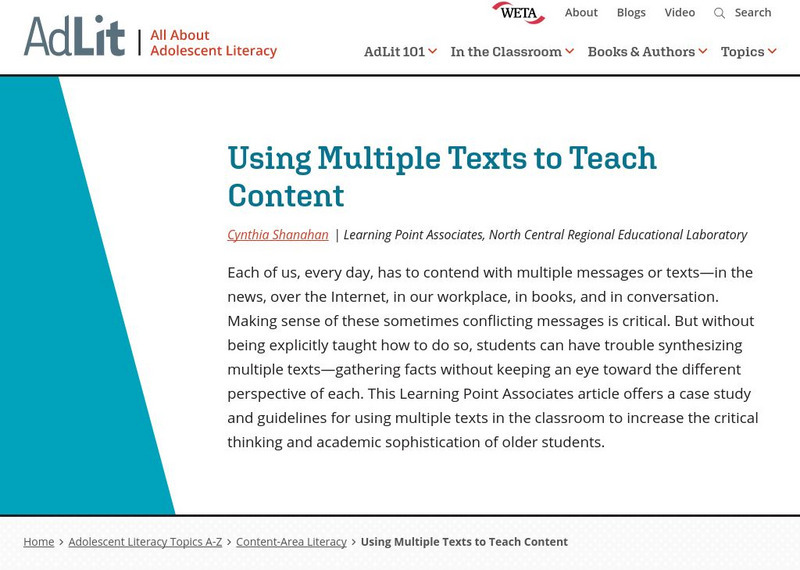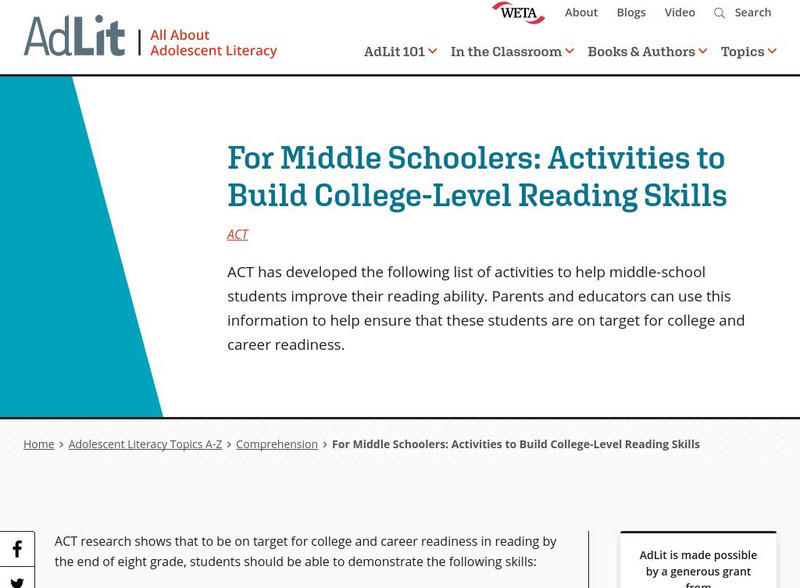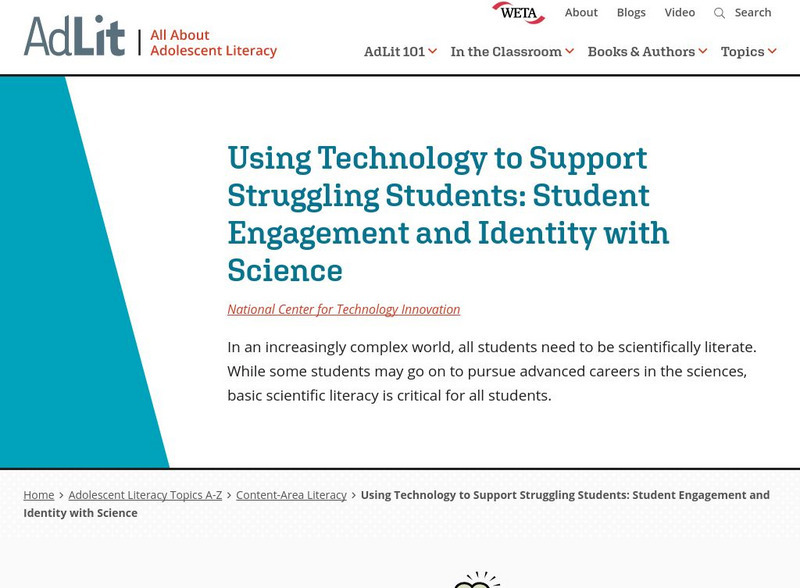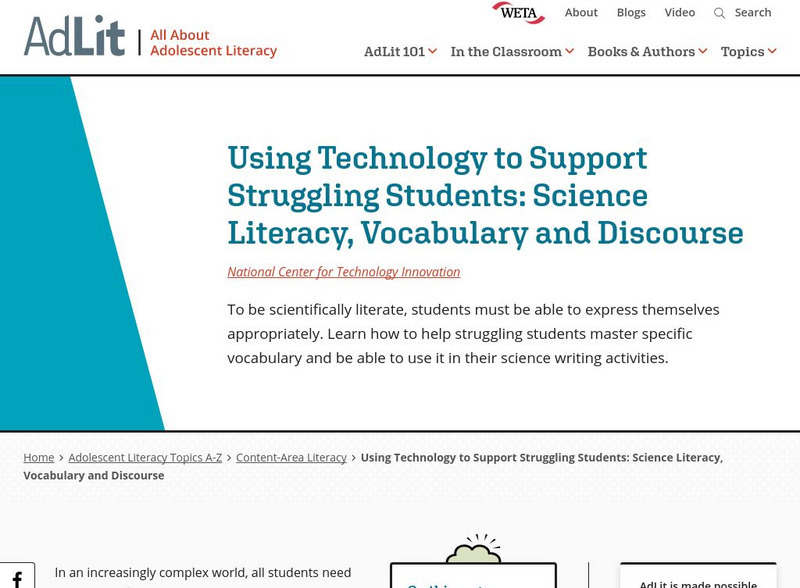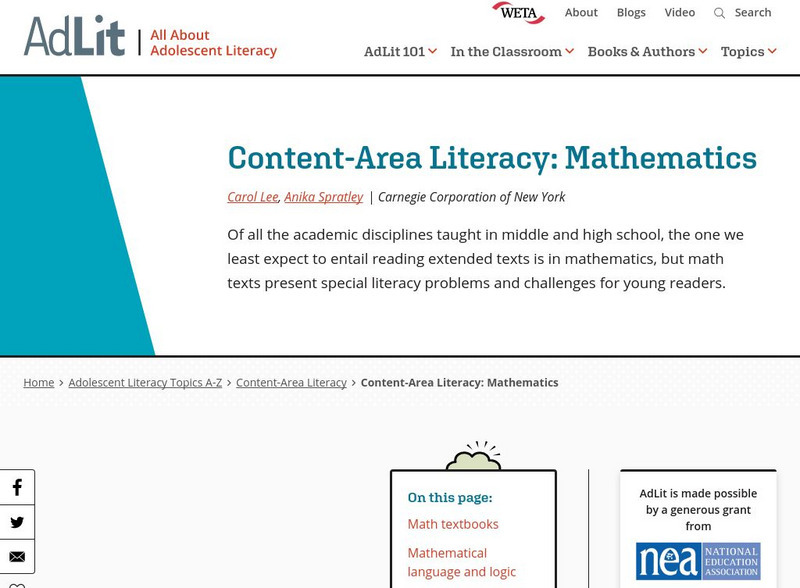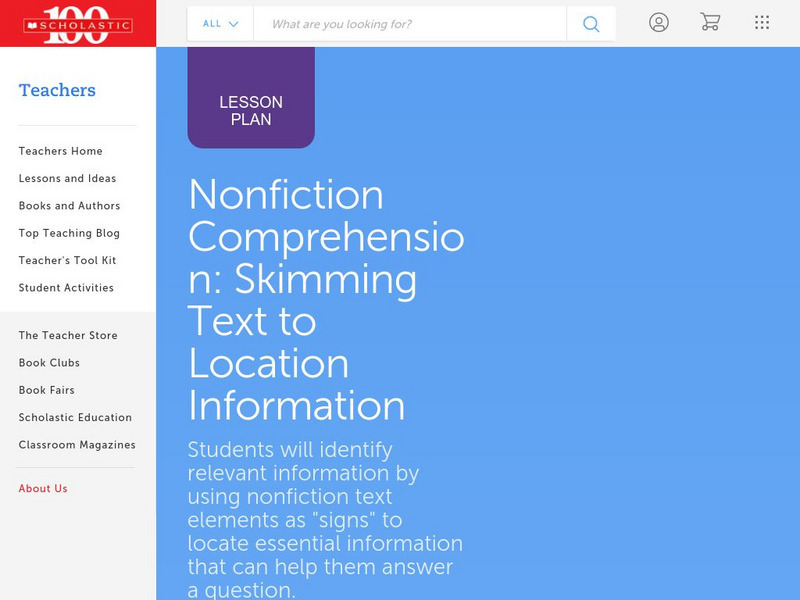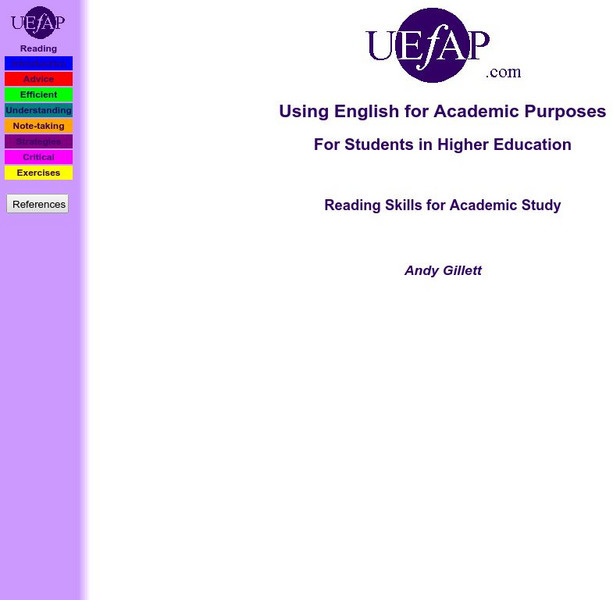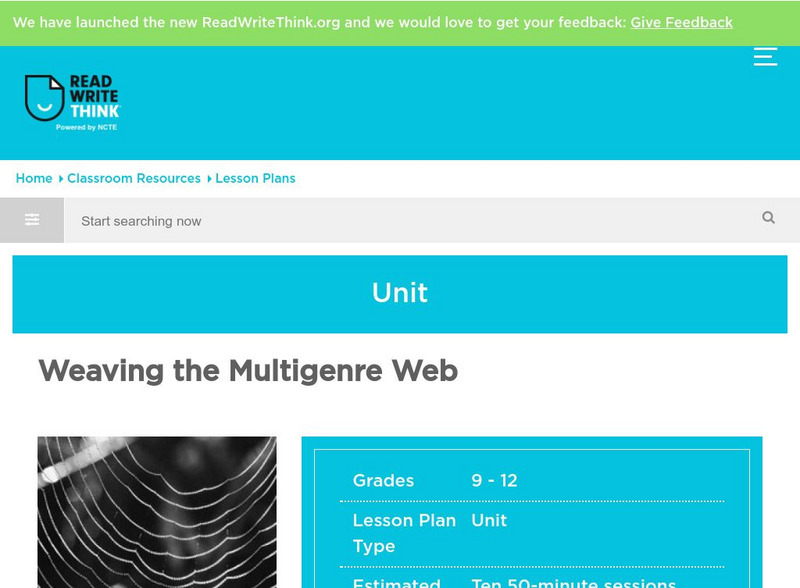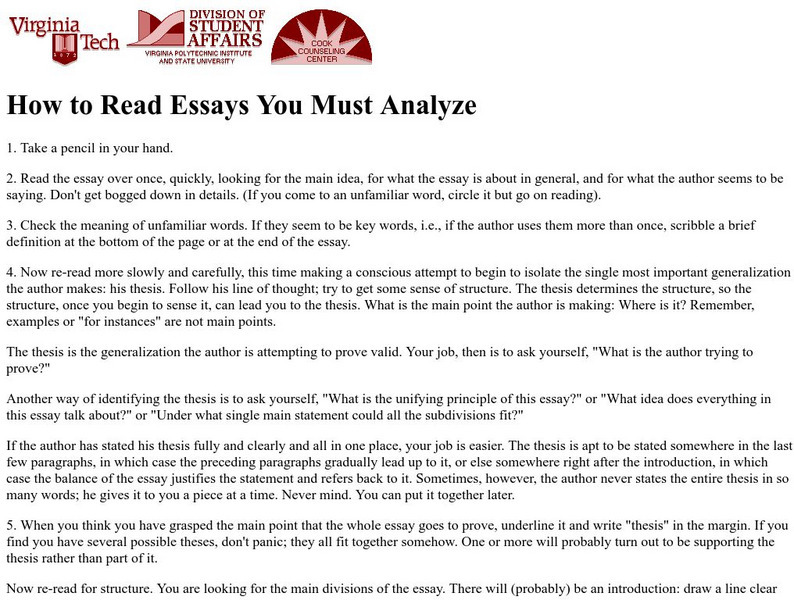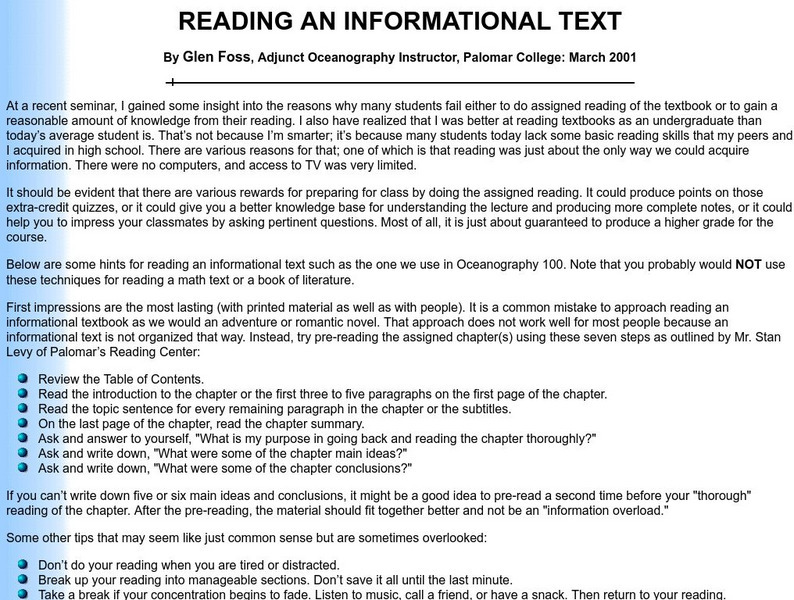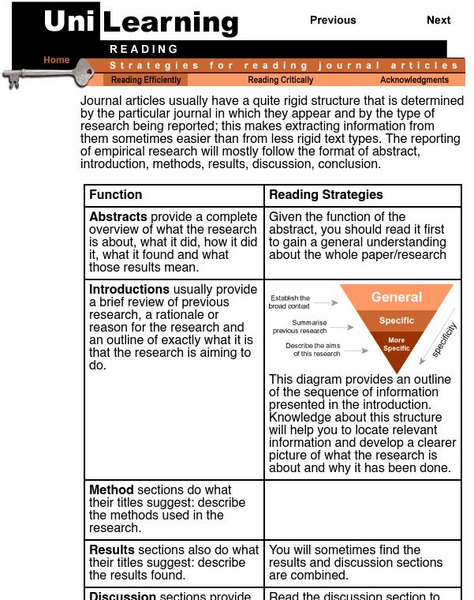AdLit
Ad lit.org: Teach the Seven Strategies of Highly Effective Readers
To improve students' reading comprehension, teachers should introduce the seven cognitive strategies of effective readers: activating, inferring, monitoring-clarifying, questioning, searching-selecting, summarizing, and...
AdLit
Ad lit.org: Seven Strategies to Teach Students Text Comprehension
Comprehension strategies are conscious plans - sets of steps that good readers use to make sense of text. Comprehension strategy instruction helps students become purposeful, active readers who are in control of their own reading...
AdLit
Ad lit.org: Using Multiple Texts to Teach Content
Each of us, every day, has to contend with multiple messages or texts-in the news, over the Internet, in our workplace, in books, and in conversation. Making sense of these sometimes conflicting messages is critical. But without being...
AdLit
Ad lit.org: For Middle Schoolers: Activities to Build College Level Reading Skills
ACT has developed this list of activities to help middle-school students improve their reading ability. Parents and educators can use this information to help ensure that these students are on target for college and career readiness.
AdLit
Ad lit.org: Key Literacy Component: Text Comprehension
Text comprehension allows readers to extract or construct meaning from the written word. Students who misread words or misinterpret their meanings are at a disadvantage. Proper instruction can boost students' skills in this key area.
AdLit
Ad lit.org: Using Technology to Support Struggling Students
In an increasingly complex world, all students need to be scientifically literate. While some students may go on to pursue advanced careers in the sciences, basic scientific literacy is critical for all students.
AdLit
Ad lit.org: Using Technology to Support Struggling Students: Vocabulary
To be scientifically literate, students must be able to express themselves appropriately. Learn how to help struggling students master specific vocabulary and be able to use it in their science writing activities.
AdLit
Ad lit.org: Content Area Literacy: Mathematics
Of all the academic disciplines taught in middle and high school, the one we least expect to entail reading extended texts is in mathematics, but math texts present special literacy problems and challenges for young readers.
AdLit
Ad lit.org: Content Area Literacy: Science
The demands of comprehending scientific text are discipline specific and are best learned by supporting students in learning how to read a wide range of scientific genres. Besides text structures emphasizing cause and effect, sequencing...
AdLit
Ad lit.org: Key Literacy Component: Fluency
Fluent readers can read text accurately, smoothly, and with good comprehension. Students who get bogged down in the mechanics of reading have trouble with this skill. With proper instruction, struggling readers can improve their fluency.
AdLit
Ad lit.org: Assistive Technology Tools: Writing
Learn about assistive technology tools - from abbreviation expanders to word-recognition software programs - that address your child's specific writing difficulties.
AdLit
Ad lit.org: Assistive Technology Tools: Reading
Learn about assistive technology tools - from audiobooks to variable-speed tape recorders - that help students with reading.
AdLit
Ad lit.org: Adolescent Literacy: What's Technology Got to Do With It?
Learn how technology tools can support struggling students and those with learning disabilities to acquire background knowledge and vocabulary, improve their reading comprehension, and increase their motivation for learning.
AdLit
Ad lit.org: Extended Writing to Learn Strategies
Writing enables students to process, organize, formulate, and extend their thinking about what they have been learning. In addition, teachers can also assign writing to help students evaluate what they know and understand about a topic....
AdLit
Ad lit.org: Key Literacy Component: Writing
Students who don't write well aren't able to learn and communicate effectively. This article explains what good writing skills are and how to help struggling young writers gain those skills through proper instruction.
Scholastic
Scholastic: Lesson Plan for Nonfiction Comprehension: Skimming Text
Build comprehension by developing reading strategies for use with nonfiction text. This lesson focuses on teaching students to recognize text elements as clues to help them quickly locate key information in text.
Writing Fix
Writing Fix: Writing Scientific "Recipes"
Adapted from a lesson in the book 51 Wacky We-Search Reports by Barry Lane, this lesson asks students to read several recipes to gain an understanding of how they are written and the types of words they use. Then students demonstrate...
E Reading Worksheets
E Reading Worksheets: Genre Worksheets
This learning module provides remediation with identifying genre of books and various texts. Practice with capitalizing nouns is provided with through worksheets, an online site, and a video tutorial. .
Other
Seeing the World in Print Through Nonfiction
Unit plan containing five lessons designed for tenth graders. They center around reading and writing nonfiction, and they teach skills such as identifying the features of nonfiction and writing expository texts. All are aligned to...
Other
Reading Skills for Academic Study
Designed for university students in the United Kingdom but applicable to English and advanced ESL students in other countries, this tutorial provides strategies and skills for required academic reading loads.
ReadWriteThink
Read Write Think: Weaving the Multigenre Web
Students analyze the elements of a novel in many different genres and then hyperlink these pieces together on student-constructed Websites.
Virginia Tech
How to Read Essays You Must Analyze
Provides a detailed discussion on how to approach an essay for analysis.
Palomar Community College District
Palomar College: Reading an Informational Text
Glenn Foss, an instructor at Palomar College, discusses some possible reasons why students have problems reading and recalling textbook material. Provides an outline for seven steps of effectively reading assigned material.
Other
Uni Learning: Strategies for Reading Journal Articles
Clear explanation of how journal articles tend to be structured, as well as tips for extracting information from each part. Includes sample, color-coded exercises.




